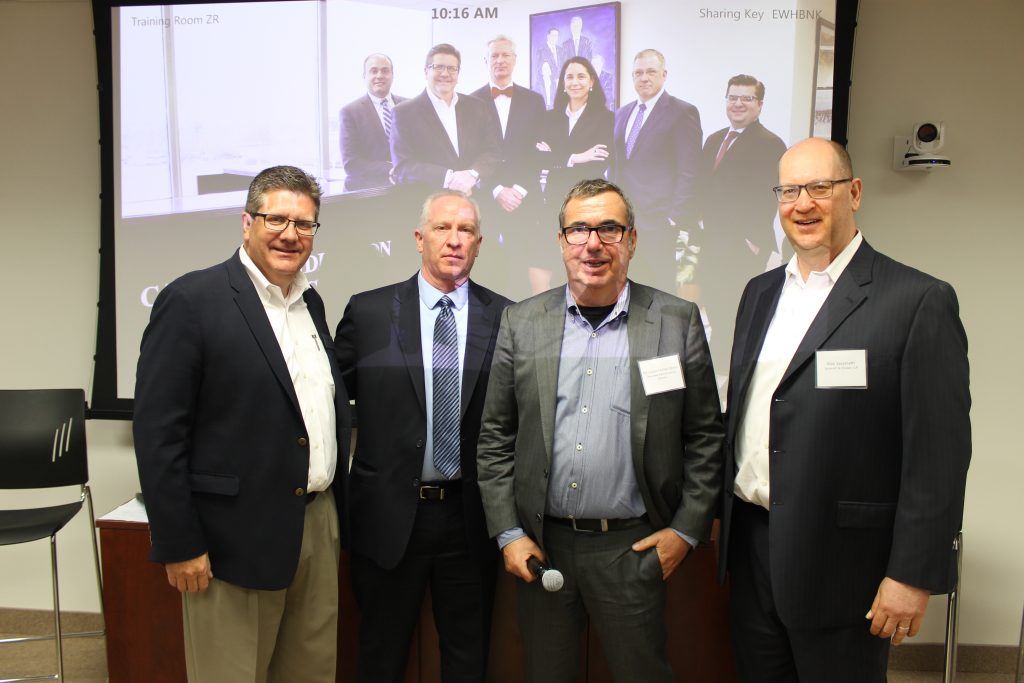
Recognized for being on the cutting edge of legal and business issues, Campolo, Middleton & McCormick hosted the first in a series of international business panels on June 13, 2019, featuring a panel of legal, accounting, and M&A experts discussing a host of issues facing U.S. companies doing business abroad. “Grow Local, Go Global: Your Roadmap for Doing Business Internationally,” co-hosted by Protegrity Advisors, featured a wide-ranging discussion about international business law in the EU, international tax practices, EU GDPR data compliance, the opportunities and difficulties presented by Brexit, and other issues for local businesses to consider when expanding or operating overseas. CMM Managing Partner Joe Campolo moderated the panel, which included Gregg Schor, Chairman of CMM International and CEO of Protegrity Advisors; Alan Sasserath, Partner of Sasserath & Zoraian, LLP and international tax expert; Dr. Justus Fischer-Zernin, Partner and Solicitor at Hanselaw Hammerstein & Partners in Hamburg, Germany; and Geert Somers, Partner and Attorney at Timelex in Brussels, Belgium.
In attendance were Long Island businesses who had questions about expanding overseas or how to deal with issues with their existing global operations. In an in-depth discussion enhanced by a wealth of personal experience provided by the panel, local businesses learned the importance of building an international network and obtaining local counsel to use as a resource when they want to expand overseas. Some highlights from the panel include:
- Authorities in the EU have begun to crack down on the implementation of the GDPR data and privacy protection laws. These laws apply not just to companies located in, or with a physical presence in Europe, but also to businesses who offer products and services to the EU. GDPR compliance is now at the top of the list when checking out an international company’s due diligence.
- Real estate laws are not uniform across the EU; however, bank financing of investment properties is regulated by governments.
- When performing consulting work in the EU without establishing a permanent presence there, a U.S. business will not need to pay taxes; however, it should be noted that there are certain thresholds for what equates to a “permanent establishment” and the longer or more frequent the consulting work is, then that threshold may be met.
- When providing consulting work overseas, specifically in the architecture and engineering fields, the first question a business must ask is whether they have the equivalent or necessary certifications to supply services in their targeted country.
- When a business wants to expand into Europe, what country should they choose? The panel suggested doing research regarding the potential customer base, with Sasserath stating that the U.S. government can provide some fact finding regarding potential overseas customer bases for a fee. They also suggested assessing the tax situation of the recipient country beforehand. Dr. Fischer-Zernin advised that setting up a subsidiary would be easier than a branch, because a subsidiary can operate the same way as all other companies in that country and thus offer fair and equal competition. Somers noted that many U.S. businesses expand into Brussels due to the prevalence of English spoken there and the fact that it is conveniently located within Europe.
- One issue for local businesses to consider is the relative difficulty of finding, hiring, and firing employees in Europe compared to the States. Schor advised U.S. businesses to be careful and to find a distributor overseas who is in line with their interests, as well as to negotiate a contract that provides exclusivity and some guarantee of profits. He also recommended negotiating an exit strategy going in, so that U.S. businesses are aware of all local laws that will apply if they must relocate or close an overseas branch.
- Regarding Brexit, both Dr. Fischer-Zernin and Somers noted that the United Kingdom will still mostly have to follow European Law when doing business with the EU and that many U.S. businesses who once used the U.K. as a gateway to Europe are now opening branches in Ireland and Amsterdam instead. Sasserath, however, assessed that U.S. businesses should not have a fear of the unknown when contemplating expanding into the U.K., should continue to take informed, measured steps when doing business, and that there would be more opportunity for U.S. businesses to go into the U.K. and access a market due to Brexit. Schor stated that from an M&A perspective, the market was very healthy, and that Brexit would likely lead to more U.K. investment in the States.
CMM, through its CMM International offering, plans for this informative, important and increasingly relevant discussion to become the first of many events addressing the benefits, potential pitfalls and basic guidelines of doing business internationally. For specific questions regarding your personal situation, please contact our office.

